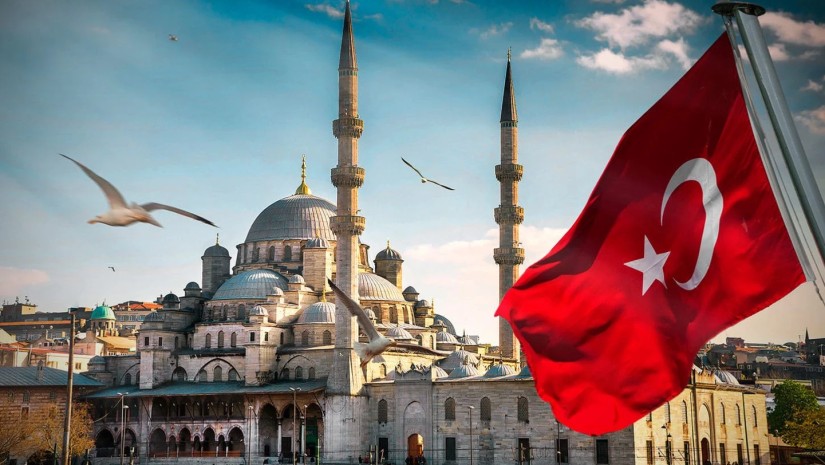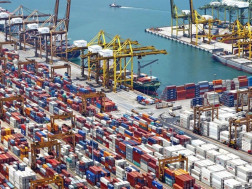Turkey, the country that Mustafa Kemal Atatürk, or Mustafa Kemal Pasha founded on October 29, 1923, has always been a good training ground for traders and investors due to its dynamic capital market and rather volatile currency TRY Turkish Lira.
Türkiye, the bridge between Asia and Europe, has always been a fascinating blend of cultures and traditions. Its rich history and strategic location have made it an important country in regional and global politics.
According to Bloomberg data, over the last 5 years, Turkish equities as in country ETF TUR iShares MSCI Turkey ETF, have outperformed global equities URTH by +48%.
On the eve of Mr. Erdogan’s re-election the TRY traded around 20 levels to the U.S. dollar and the BIST 100 index, according to Bloomberg data was the 2nd worst performing stock market in the world. Today the TRY is trading around the 27 big figure handle and the stock market increasingly looks bullish. BIST-100 Index is trading at a price-to-earnings ratio of 6.9 on a trailing basis and 6.6 times estimated earnings of its members for the coming year. The index's dividend yield is 1.6% on a trailing 12-month basis.
President Erdogan's post-election pivot to establish a market friendly economics team has led the resurgence of interest in Turkish capital markets. The policy pivot has caused a profitable reversion to mean in the stock market. As of today, the Turkish stock market BIST 100 index is the 4th best performing stock market in the world with +40% gain.
Year-to-date however turkey country ETF underperformed global equities by -11.82% according to Bloomberg data. This could be a profitable set up for a tactical asset allocation to Turkish equities and its country ETF.
Turkey’s Treasury and Finance Minister Mehmet Simsek recently stated monetary tightening will continue to support or stabilize the currency while urging local banks to prioritize corporate loan growth.
The meltdown of the Turkish lira since 2017 has made equities, with their growth potential, a classic inflation hedge for retail investors. This is why the list of registered investors on the Istanbul stock exchange has doubled from 2-4 million.
After 20 years in power Mr. Erdogan will rule the country for another 5 years and investors are looking for a more stable lira and growth friendly economic policies by the government of President Erdogan.
In order to improve global investor confidence, President Erdogan put together a Wall Street dream team with Mehmet Şimşek (ex-Merrill Lynch bond strategist) as Finance Minister and Hafize Erkan (Goldman, quant and First Republic Bank COO) as Governor of the central bank has been fabulous for the Istanbul financial markets.
Turkish credit default swaps have finally fallen in the last two months. Foreign investors have been net buyers of Turkish equities since June for the longest period of time since 2023 and the Borsa Istanbul index is up 40% and now the 4th best performing market globally.
Turkey still has the dubious distinction of the having some of highest negative real interest rates in the world. The latest Turkish Central Bank August Survey 12-Month CPI (consumer Price Index) Estimate stands at 42.01%
The global FX market has realized that and adjusted / re-priced to that so that the Turkish lira has plunged from 19.5 in mid-May to 27 level now, 38% depreciation. This makes buying Turkish equities in Istanbul problematic for USD base currency investors even though the valuations of some Turkish banks have reached true value investing levels.
In 2023 the country run by Mr. Erdogan officially changed its name to Türkiye at the United Nations.
Turkey has been spelled and pronounced Türkiye (Tur-kee-yeah) in Turkish since the country became a republic in 1923.
The country began a push for the rest of the world to adopt the same spelling and pronunciation in 2021. Last year, the country became known as Türkiye to the United Nations.
While English speakers have historically referred to the country as Turkey, it has been spelled and pronounced Türkiye (Tur-kee-yeah) in Turkish since the establishment of the modern Turkish republic in 1923.
The country began a push for the wider world to adopt the same spelling and pronunciation in 2021.
Foreign Minister Cavuşoğlu said in a tweet that the move would "increase our country's brand value".
Turkey's nominal GDP peaked at $1.029 trillion in 2023, while its nominal GDP per capita peaked at $12,489 in 2013.
As any frequent traveller might attest to, similar to SIA singapore airlines in the 1970s and 1980s, TK Turkish Airlines contributed to building country’s brand. Today, the Turkish Airlines business class at IST Istanbul international airport is most probably the best business class lounge in the world.
Last five-year Turkish airlines share price performance + 1535% versus Germany’s Lufthansa -48% and Singapore’s SIA +12% . Coincidentally Turkish airlines or Turk Hava Yollari AO is the largest stock allocation in the TUR ETF with 7.4% allocation. Turkish airlines current valuation is 6.4x P/E and an ROE return on equity of 26.9%
TUR is MSCI iShares turkey ETF which closed the week ending august 18th at USD 35 levels and a dividend yield of 3.58%. one year dividend growth of the ETF stood at +94.82%. source: Bloomberg.
Türkiye’s flag carrier plans to expand its international connectivity by launching flights to Detroit, Osaka and Australia. Turkish Airlines ranks first in the world by destination countries.
A resilient, fast-growing economy, Türkiye offers business-friendly policies, a deep talent pool, and global market access at the nexus of Europe, Asia, and Africa to attract sustainable foreign direct investments (FDI). With its geostrategic location, manufacturing capabilities, young and dynamic population, and developed logistics infrastructure, Türkiye has become a regional powerhouse where manufacturing activities of multinationals are supported by R&D centres, design teams, procurement offices, logistics hubs, and regional management centres. Today, almost 80,000 international companies operate in Türkiye.
Turkish Investment Office, or Invest in Türkiye has been established back in 2006 to address the needs of international investors not only for greenfield investments but also financial and strategic M&A activities as well mainly by serving lucrative deal opportunities and matchmaking those parties. The Office has also been working with major PE or VC funds to facilitate co-investment opportunities across different sectors. Thanks to the ever-growing energy hub position and increasing tourism business opportunities of Türkiye, renewables and hospitality assets are shining out amongst those industries which also provide a natural hedge mechanism to the investors. According to Ahmed Emre Buyukkilic from South East Asia Representative of Turkish Investment Office based in Singapore.
Turkey's geopolitical situation and political stability can significantly influence investor sentiment. A stable political environment and positive relations with neighbouring countries can attract more foreign investment.
Turkey is still a higher risk emerging market because of its local politics, presidential whims and volatile offshore capital flows to finance its large twin deficits.
The new government leadership team’s focus on policy normalization and financial stability as well as pledged FDI from Saudi Arabia and the UAE have reduced the country’s risk premium.
Turkish EPS growth in the next 12 months on Turkish equities is expected to be in in the 14 to 16% range and the Istanbul Borsa is inexpensive in global equity strategy at only 7.8X earnings.
After 20 years in power Mr. Erdogan will rule the country for another 5 years, and investors have started to vote with their money as Türkiye is now again among the top 10 best performing stock markets globally.
The new economics dream team on the Bosporus and investor flows seems to increasingly indicate it could indeed be the new tiger economy of the Bosporus, creating investment returns for global investors. Market pessimism has turned to normal if not moderately bullish as of now.
Turkish central bank stated it has stopped targeting conversion from foreign currency deposits to FX-protected lira deposits, adding it aimed to boost financial stability /if not flexibility.
"As part of the simplification process, it has been decided to end the implementation that stipulates a target for conversion from foreign currency deposits to FX-protected deposits," the Central bank said in a statement.
The central statement also said the regulations were intended to increase Turkish lira deposits while decreasing FX-protected deposits by ensuring transition from FX-protected accounts to Turkish lira deposits.
As the country is on the verge of energy and economic independence during the next five years of Mr. Erdogan’s rule, it could well become the new tiger economy on the Bosporus that makes for happy investors.
Rainer Michael Preiss is Partner & Portfolio Strategist at Das Family Office in Singapore.
















